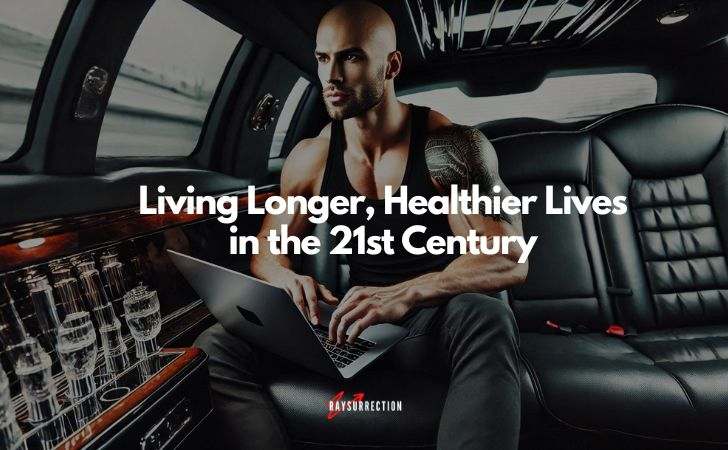People living longer has been a topic of endless debate and speculation. Common ideas include eating better, exercising more, and adopting healthier routines. These are reasonable but not necessarily groundbreaking. Okay, spend just the next 2 minutes reading this to discover an eye-opening fact - it might change your entire perspective on aging and longevity.
The Sleep Innovation
Sleep is often underestimated when it comes to staying healthy over the years. Better sleep could be the key to maintaining youthful energy and vitality. If we rethink how we rest, life expectancy might expand significantly. What would you change about your sleep to improve its quality?
- Install a zero-gravity sleep pod at home. Floating mid-air in a cocoon-like chamber could reduce physical strain and improve circulation. These pods may also simulate an ideal sleep environment with adjustable light and temperature.
- Use personalized dream programs to train your brain. Imagine a device that lets you replay calming, positive dreams to reduce stress and promote neural health. This could even help in solving problems or learning while you sleep.
- Sleep in ultra-dark sensory rooms. Blackout rooms equipped with soundproof walls could remove distractions completely. This might let you wake up more refreshed than ever.
- Experiment with multi-phase sleeping. Breaking up rest into shorter cycles throughout the day might suit individual energy needs better than the traditional eight-hour block.
What if sleep could become a tailored experience unique to each person? Would better sleep technology change how you feel during the day?
Reimagining Nutrition
Eating habits are critical for long-term health, but traditional diets might not suffice in the longevity transformation. If we could customize food to our biological needs, the impact on our health might be extraordinary. What shifts in nutrition could help people thrive for over a century?
- Grow personalized food through bioprinting. A 3D printer in your kitchen could create meals tailored to your genetic needs. These meals might maximize nutrient absorption while minimizing waste.
- Adopt algae-based cuisine for efficiency. Algae is packed with proteins, vitamins, and essential fatty acids. It could replace resource-intensive foods like beef and pork in everyday meals.
- Consume meals with built-in supplements. Each bite could be engineered to include antioxidants, nootropics, and probiotics, optimizing health without extra pills or powders.
- Shift to flavor capsules instead of traditional dishes. Imagine getting all the taste of a hearty meal from a small, nutrient-dense capsule that requires no cooking or clean-up.
What new foods would you try if they promised to improve your health and longevity? Could advanced nutrition make traditional cooking obsolete?
Fitness That Defies Aging
Exercise keeps bodies and minds resilient, but old routines may not suit future lifespans. What if fitness became an adventure rather than a task? How would these innovations reshape your motivation to stay active?
- Play full-body virtual reality games. These immersive experiences could disguise workouts as fun, stimulating both muscles and the brain. Dynamic obstacles and challenges might adapt to your fitness level.
- Wear exoskeletons for enhanced mobility. Lightweight, robotic suits might help you lift, run, or climb with ease. This technology could also protect joints from wear and tear.
- Join dance marathons with AI partners. AI companions might choreograph routines based on your movements, turning fitness into an art form. This would make physical activity entertaining.
- Use underwater resistance training systems. Pools equipped with adjustable currents could allow for safer and more varied exercises. Water reduces joint strain and adds a unique form of resistance.
Would you be more active if workouts felt like games? How could technology redefine the concept of exercise?
Lifelong Learning in New Formats
Keeping your brain sharp is as vital as physical health. Traditional education might not fit the needs of people living for over a century. What kinds of learning would keep you curious and growing for decades?
- Download knowledge directly to your brain. Advanced neural interfaces might let you acquire skills instantly, from learning a new language to mastering musical instruments.
- Engage in interactive AI simulations. Virtual environments could place you in realistic scenarios to practice new concepts hands-on. This might feel more engaging than traditional education.
- Take courses designed for 3D spaces. Imagine learning astrophysics by virtually traveling through galaxies or studying history by stepping into ancient civilizations.
- Participate in global thought experiments. Holographic platforms might connect learners worldwide, encouraging debate and creativity. This could stretch your thinking in unexpected ways.
Would you learn differently if knowledge was instantly accessible? How might access to innovative learning methods change your ambitions?
Social Reinvention for Longevity
Living longer means rethinking how relationships evolve over time. Could new ways of bonding reduce loneliness and make extended lives richer? What ideas would keep social life vibrant over decades?
- Form rotating households of friends. People could take turns hosting one another in a communal living setup. This arrangement might prevent loneliness while sharing resources and responsibilities.
- Host virtual gatherings in surreal locations. Imagine chatting with friends while standing on a simulated moon or under the sea. These virtual meetups could bring variety to social interactions.
- Adopt shared parenting among larger groups. With extended lives, raising children could become a collective effort. This might lighten the load while enriching the upbringing experience.
- Create legacy storytelling hubs. Spaces equipped with advanced recording technology could capture and preserve personal histories. This would allow future generations to connect with their roots.
How would your relationships change if new social systems were introduced? Could technology make staying connected easier and more meaningful?
Reinventing Work for a Century-Long Career
Working for decades might feel daunting, but creative solutions could turn it into an adventure. What if careers became flexible and exciting instead of repetitive? What would your ideal work-life look like over 100 years?
- Rotate between multiple careers every 15 years. Diversifying work life might prevent burnout and keep things interesting. This system would allow you to explore different industries throughout your life.
- Participate in intergenerational mentorship loops. Older professionals could mentor younger ones while learning new skills in return. This might create a cycle of shared growth and mutual respect.
- Opt for flexible time-travel-like workweeks. With advances in AI scheduling, you might compress or stretch workdays to suit personal preferences. This could leave more time for hobbies and exploration.
- Run pop-up businesses for short periods. Temporary ventures might align with evolving interests while avoiding long-term commitments. This could make work feel fresh and exciting.
How would you design your career if you knew you’d live to 120? Would shorter, varied jobs feel more fulfilling?
Radical Health Interventions
Medicine might look radically different for those living well beyond 100. If health could be maintained indefinitely, what would that mean for how we live? How far would you go to stay in peak condition?
- Inject nanobots for cellular repair. These microscopic machines could patrol your bloodstream, fixing damage at the molecular level. Regular upgrades might even reverse aging signs.
- Swap out aging organs for bioprinted ones. 3D-printed tissues could replace worn-out parts without waiting for transplants. This might extend functionality well into old age.
- Use genetic editing for disease prevention. Tweaking DNA could eliminate inherited risks or boost immunity against illnesses. Scientists might even enhance physical traits like strength or stamina.
- Schedule regular whole-body scans. Advanced imaging systems could detect and address health concerns long before symptoms appear. This might reduce the impact of age-related conditions.
Would you trust technology to maintain your health indefinitely? What new medical advancements would you consider trying first?
Best Seller: Xtend BCAA + Recovery

We earn a commission if you click this link and make a purchase at no additional cost to you.
Redefining Leisure and Hobbies
With more years comes more time for enjoyment. Leisure activities might evolve to suit longer lives, sparking creativity and excitement. What hobbies would you try if time was unlimited?
- Explore outer space as a tourist. Affordable space travel could let you visit the Moon or Mars during your retirement. This could add a cosmic dimension to leisure time.
- Design personal amusement parks. Home-based systems might simulate roller coasters, virtual hiking trails, or even underwater adventures. These attractions would bring thrills without travel.
- Participate in multi-century art projects. Contribute to creations meant to span lifetimes, like painting a mural over 100 years. This might leave a legacy of shared creativity.
- Compete in hyper-immersive sports. Advanced simulations might allow you to play soccer on alien planets or race across futuristic landscapes. This would merge fitness and entertainment seamlessly.
Would extended leisure time make life more enjoyable? How would you balance new experiences with relaxation?
Conclusion
Living longer could mean reinventing every aspect of daily life. From the way we sleep and eat to how we work and play, the possibilities are endless. While some ideas might seem outlandish today, they could pave the way for exciting futures. What would you try first?




